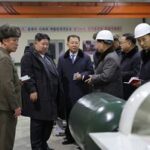|
China’s Purchasing Managers’ Index (PMI) in January has fallen below 50 for four consecutive months, signaling a prolonged economic downturn.
On the 31st, the National Bureau of Statistics of China announced that the PMI for January increased by 0.2 points from the previous month, reaching 49.2. Although this marked the first rebound in three months, meeting experts’ expectations, it still fell short of the benchmark 50.
The PMI, compiled based on surveys of corporate purchasing managers, serves as an indicator of economic trends in the relevant field. A score above 50 signals economic expansion, while a score below 50 signifies economic contraction.
China’s manufacturing PMI recorded 49.2 last April and remained in a state of economic contraction for five consecutive months until August. It rebounded to 50.2 in September but has since failed to surpass the benchmark of 50. The economic recovery has faltered since the fourth quarter of last year, further shrinking the real economy. Only large enterprises surpassed the benchmark, scoring 50.4, while medium-sized and small enterprises scored 48.9 and 47.2, respectively.
The PMI for non-manufacturing sectors, such as services, recorded 50.7 in January, up 0.3 points from the previous month, slightly surpassing the forecast of 50.6.
Given these circumstances, the local economic situation remains unfavorable. According to the Chinese economic media, Caixin, the economic growth targets announced by 31 provinces, autonomous regions, and municipalities for this year have been lower than last year’s targets. At the local assemblies in 2024, 16 regions decided to lower their economic growth targets compared to last year. Eleven regions froze their targets, and only four regions set higher targets than the previous year. Workers are also feeling the impact directly, with their incomes decreasing. According to Zhaopin, China’s online job platform, 32.3% of China’s white-collar workers experienced a wage decrease last year. With no signs of improvement in the overall economic situation, concerns are growing that China’s deflationary pressure (price decline during an economic downturn) will intensify. In fact, China’s consumer prices have been falling for three consecutive months until December last year, marking the longest decline since 2009.
















Most Commented